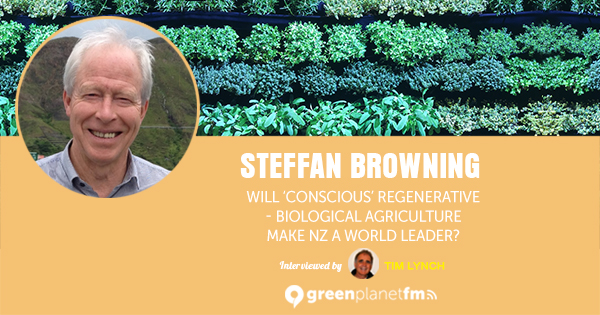
The Portfolios that Steffan held in the NZ Green Party were:
In this interview many subjects were rapidly covered so as to give an overview of what are the possibilities of a free, truly green, healthy and independent
country - one that is happily embedded in the biosphere.
Steffan says that in relation to our small organic food growers - we have to make sure that they can survive as we are asking of them to grow the finest
quality and healthiest, highest - nutritional food. So it is imperative that our growers survive economically too.
Steffan who for 15 years was an organic producer says organic growers have to be able to survive themselves and put a roof over their head and feed their
children - and they are up against industrial food production which is produced cheaply by using in his words - some very ugly chemicals and ugly fertilisers
as well. These then degrade our rivers and that the chemicals are impacting on our health - that there are a considerable amount of chemicals in our
food - so how do we compare our food? What is cheap food? Because the cost of these chemicals on top of our national health system and into our environment
are not considered in NZ’s industrialised retailed food prices.
Where as, organic producers holistic perspective does not, in most circumstances pollute waterways or the air with chemical sprays - and there are no known
health and hospital costs as a result of eating organic food.
Steffan says there is a problem with costs - but as an organic producer - he at the peak of the season for a number of weeks - could and did sell organic
food at the same price of industrial vegetables. He also mentioned that industrial farming is also subsidised in the form of cheap chemicals.
Steffan produced capsicums, tomatoes, aubergines (eggplant) beans, cucumbers, basil and chilli peppers - these were his primary crop.
By blanket use of heavy chemicals across a whole farm - all pests as well as benevolent insects are killed - it’s an easy fix. Whereas organic farmers
target what needs to be curtailed and do this with traps, and other noninvasive chemical means.
There is a world wide decline of insects. Where 50 years ago if you drove 50 kilometers through a rural setting there would be huge numbers of dead insects
splattered on the window screen of your car. Today - basically none - zilch.
Steffan says there are two reasons that he knows of.
1) Habitat has gone - bare earth actions be it farming and urbanisation - take away diversity - less trees, wetlands, shrubs, scrub and herbs.
2) Chemicals nicotinoids - the ‘neo nix’ - is what they are called for short - is known to kill bees and affect their health including
other beneficial insects - plus there are also fungicides and herbicides as well.
France in Europe is an excellent example of push back against these sorts of chemicals - having kicked out Monsanto as they restore ecological balance
to their environment.
France too has a huge number of organic food outlets right across the country - and are far more conscious of their food production and consumption. Food
that is close to ‘use by’ date is never incinerated or sent to landfill - but sent to hospices and other needy outlets and possibly prisons etc = far
less waste. Also Supermarkets will not buy from farmers who use nicotinoids. This is due to commercial outlets across France listening
to consumer demands.
Steffan goes on to say that our NZ regulators - our ‘environmental protectors’ as in the likes of Government - need to say that we are going to do the
right thing … and bring in the ‘precautionary approach’ but, instead - our regulators are turning away and ignoring their social responsibility.
New Zealanders have to keep the pressure on the EPA, the Environmental Protection Agency and the Regulators - where he says we need some major changes
- especially in the Ministry for Primary Industries, particularly their lack of vision and their lack of courage in not standing up to industry There
are also conflicts of interest - especially around GE & GMO’s and the release of these materials. That some of these officials have actively promoted
GE and promoted chemicals when their job is to be a watchdog - for our NZ environment!
Especially when they are actively wanting easier access for GE materials to be released into the NZ countryside - and this message is coming from the CEO
of the EPA - which is extremely concerning.
The community and the environment have be at the forefront - before the economy.
Steffan then mentions that he has just been elected back onto the Soil and Health National Council
Steffan talks about the recent breakthrough that brought about a ‘GE Free Northland’. Plus the Soil and Health Association working with these Northern
Councils enabling them - along with a huge number of ordinary NZers who volunteered their time to do submissions and rally to this cause - etc.
That the Soil and Health Association was able to get NZ’s High Court to back them in making sure that Councils such as Northland, Hastings, Hawkes Bay
and to a certain extent the BOP - Bay of Plenty - the power to keep out experimentation from GE corporations. These biotech entities always wanting
to release GE organisms into the environment, any environment.
Also covered. ‘Gene editing and CRISPR, also called CRISPR/Cas9.’ - etc so as to manoeuvre to find loopholes to let these experiments
into the environment - but fortunately the EU has come out and said they are the same as genetic engineering! Which is a blessing for NZ.
The Precautionary Approach - is not anti science - It takes our children’s future into consideration.
Steffan goes on to say - he is not stalling innovation There are many ways that scientists can use these tools in labs to research both plants and animals
that can be used in non GE settings - He said we must not release these products into our environment - it’s very reckless to do so.
New Zealand can still be the clean green 100% direction that at heart - we want.
Our overseas consumers expect high quality food products - pesticide free - GE FREE - and leaving our country in a pristine state at the same time.
Our growth in organics is increasing rapidly - and exports enable us to obtain premium returns.
As a result of regenerative agricultural systems, biological farming offers a prosperous future.
Bailey Perryman in Cultivating urban farming and Penelope Bundy have joined Organic NZ so we can
look forward to a sustainable drive towards organics here.
Hear how successive NZ governments have taken away the funding for ‘soil science’ in our major universities - and it is the soil that is the backbone of our country.
Air in NZ what is the quality?
Depends on where you live.
Marlborough for example - far to much chemical drift from viticulture - exacerbating cancers and degenerative diseases.
However in Marlborough there is now a significant growth in organic wines - so no chemical spray are used by them. HOWEVER - there is also an increase
in non organic vineyards in the region as well, which continue to spray.
But there are now ample organic wines available to drink here in NZ.
Rivers - nitrates and very poor forestry practices - or soil erosion have been deteriorating the water course right out to estuaries and sea. The fishing
grounds are suffering major problems but as it has been politicised - it is now getting the NZ public’s attention.
Education comes through time and again in this interview - education is the answer.
NZ allowed a whole host of pests to be brought in the country 100 to 150 years ago and this has caused problems that still have to be urgently addressed.
1080 is a very cruel death … listen to Steffan, who does not like it. Listen
He is very concerned
We need hunters to go out and cull pests and also utilise the skins and meat if safe to do so.
Mycoplasma bovis in cows - we needed to cull them straight away. It’s a huge health problem for cows.Bio security was very slow at waking up to this outbreak!
5 Eyes Echelon listening and recording station in Blenheim - close it down is his statement.
It persists regardless of who is in Parliament. No NZ Government seems to have the power to close it?
Finally the air above us - what is Geo engineering - vapour trails, contrails and chemtrails?
The fact that analysis of the particulates are Barium, Aluminium and Strontium - what are these minute chemicals? And what is solar reflection? Solar radiation
management (SRM) projects are a type of climate engineering which seek to reflect sunlight and thus reduce global warming.
https://www.nzherald.co.nz/world/news/article.cfm?c_id=2&objectid=11940711
Nov 5, 2017 - A new study has lifted the lid on chemtrails. ... The chemtrails conspiracy says that airliners are deliberately spraying chemicals.
This interview is definitely worth a listen.
